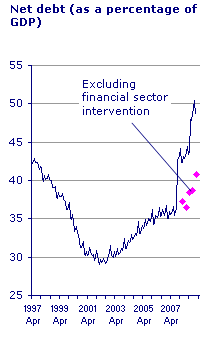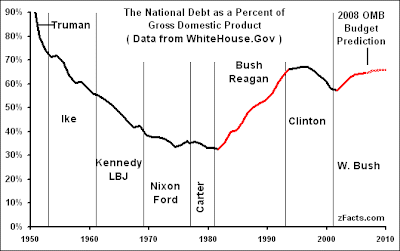 With the Northern Rock nationalisation and various other bank bail-outs/prop-ups, the government has conjured up a whole load of cash from somewhere. But where exactly does a country's government borrow money from?; all the UK's other country buddies seem to be in the same situation, so surely they can't be helping out. Does it borrow from the Bank of England? If so, do they just print more money? (but that would cause inflation) I've heard that the “Federal Reserve” (in the USA) is neither Federal, nor has any reserves, is it possible the Bank of England is privately owned too?!.....:
With the Northern Rock nationalisation and various other bank bail-outs/prop-ups, the government has conjured up a whole load of cash from somewhere. But where exactly does a country's government borrow money from?; all the UK's other country buddies seem to be in the same situation, so surely they can't be helping out. Does it borrow from the Bank of England? If so, do they just print more money? (but that would cause inflation) I've heard that the “Federal Reserve” (in the USA) is neither Federal, nor has any reserves, is it possible the Bank of England is privately owned too?!.....:Bank of England was originally a private entity given a monopoly over issuing money by royal charter, in return for a huge government loan. It was nationalised in 1949 [by a Labour government].The idea and reality of the National Debt came about during the 18th century, also managed by the bank. Responsibility for government debt management was transferred to the new UK Debt Management Office in 1998.
[Wikipedia]
 That all seems above board; so the Bank of England is a branch of government, that doesn't really seem to do very much at all any more. An offshoot of it sells government bonds and “gilts” to the private sector. Meaning that anyone in the world with numbers in their bank account can give them to the government. Generally these generous souls consist of:
That all seems above board; so the Bank of England is a branch of government, that doesn't really seem to do very much at all any more. An offshoot of it sells government bonds and “gilts” to the private sector. Meaning that anyone in the world with numbers in their bank account can give them to the government. Generally these generous souls consist of:
- Investment trusts
- Private individuals
Of course, government doesn't rely on charity; these loans will be paid back, through future taxation (rises if necessary), and with interest. UK National debt at the start of 2008 was £512Bn with total national debt interest payments of 31Bn for 2007: that's roughly 6% per annum. 2.5% of GDP (all the money UK citizens earned that year). At the end of December 2008 after the troubles last year, debt was £697.5Bn, which makes debt repayments the 4th bigest governmnet expense, behind social security, health and education, and just ahead of the defence department! And because selling of government bonds is open market, to sell more, higher interest rate repayments have to be offered, to encourage buyers.
Sounds bad, right? But looking at the table of national debts of all countries [1], the UK is right down the bottom with it's measly 47.5% of GDP. The US has 71% and Japan 194%! Apparently it makes a major difference as to the nationality of the financial entities who own the debt: with a country of prudent savers, the Japanese own 90% of their own debt (and interest rates set by Japan's central bank are low, making debt repayments low too). Whereas, 25% of the US's is foreign controlled, meaning that it is haemorrhaging money to other economies through repayments. Biggest US debt owners:
Japan - $592bn
China - $502bn (China has a total of $1trillion dollar based assets)
UK - $252bn

[above: US national debt, % of GDP]
To keep current events in context, look back at the figures for national debt for the last century; the recent, huge spike from pouring liquidity into Banks is barely a blip compared to the enormous burden left by the great depression and the second world war (see graph).
 Also, pretty much all governments borrow money and as a rule, (developed) countries never go bankrupt. It is a useful tool: buffering income from taxes, and allowing the purchase of infrastructure and other public investments now, that can be more easily paid for in the future, when the country's productivity has increased. As any budding Singularitarian will know, this is a continuing, exponential increase too, thanks to technology and 'increasing returns'! So why not rack up the debt a bit?!
Also, pretty much all governments borrow money and as a rule, (developed) countries never go bankrupt. It is a useful tool: buffering income from taxes, and allowing the purchase of infrastructure and other public investments now, that can be more easily paid for in the future, when the country's productivity has increased. As any budding Singularitarian will know, this is a continuing, exponential increase too, thanks to technology and 'increasing returns'! So why not rack up the debt a bit?!
+ Extensive borrowing will mean higher taxes in the future.
+ It can have a negative effect on your country's exchange rates.
+ 'Crowding out' of private sector investment; no finance left for private enterprise (baulking the economy).
+ The Centre for Policy Studies argues that the real current UK national debt is actually £1,340 billion (103.5% GDP) including all public sector liabilities: pensions, Private Finance Initiative contracts (e.g. Northern Rock).
+ The 'demographic time bomb' means pension liabilities and healthcare demands are going to continue increasing massively.

[above: optimistic forcast of UK debt]
But I haven't entirely answered my original question!: Who, exactly, owns our national debt? Which specific individuals we are subservient debtors to I did not manage to find out. I'd quite like to know (if anyone does know). I presume (given that pensions have fallen in value by a huge amount in the last few years) that it will be a load of rich, trust fund kiddies and banker types. Which would fit in with various corporate banking conspiracies. Bankers bleeding the world dry both ways: cocking up the banking industry by being dishonestly greedy, then making a killing lending money to governments, who have to save corporations that are 'too big to fail'. There seems no incentives to stop them doing this deliberately. Even if the financial clusterfuck was pure stupidity, it still makes the rich a whole lot richer.
If only the corporate media pointed concerted focus at significant issues like this, instead of going bananas over which MP used public money to unfairly buy a second toilet brush! (As Stephen Fry says too)
 I've been playing quite a bit of Simcity 4 recently (a recurring addiction), and unlike the real world, your spending is immediately stopped the second government finances hit red, and borrowing comes at a hefty 12% per annum, flat rate, which is sure to finish you off if taking out a loan because of budget deficits. Pretty unrealistic, but it's more informative (with regards to government finance and money in general) than anything I was taught at school. The origin of money and some basic political economics really should get incorporated into standard, non-optional curriculum.
I've been playing quite a bit of Simcity 4 recently (a recurring addiction), and unlike the real world, your spending is immediately stopped the second government finances hit red, and borrowing comes at a hefty 12% per annum, flat rate, which is sure to finish you off if taking out a loan because of budget deficits. Pretty unrealistic, but it's more informative (with regards to government finance and money in general) than anything I was taught at school. The origin of money and some basic political economics really should get incorporated into standard, non-optional curriculum.
Most of the hard information above was from here: http://www.economicshelp.org/
What is money itself ???; I highly recommend watching Money as Debt:
http://www.youtube.com/watch?v=vVkFb26u9g8&feature=related

No comments:
Post a Comment
I'm very happy to see comments, but I need to filter out spam. :-)